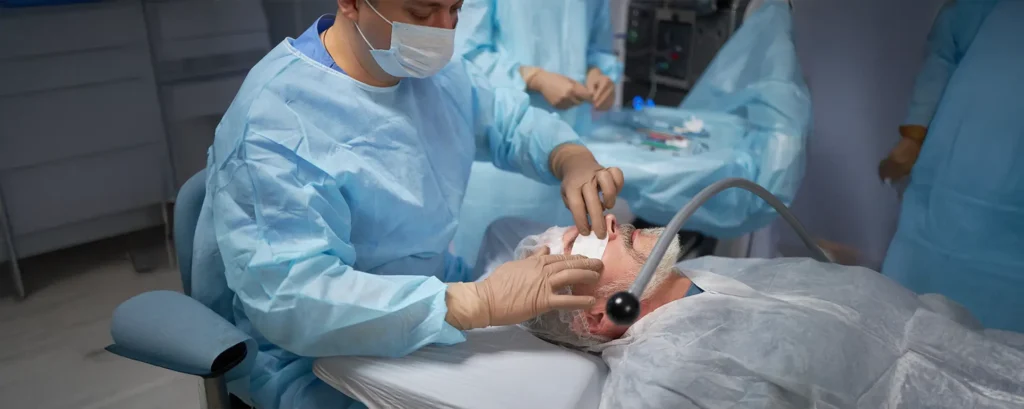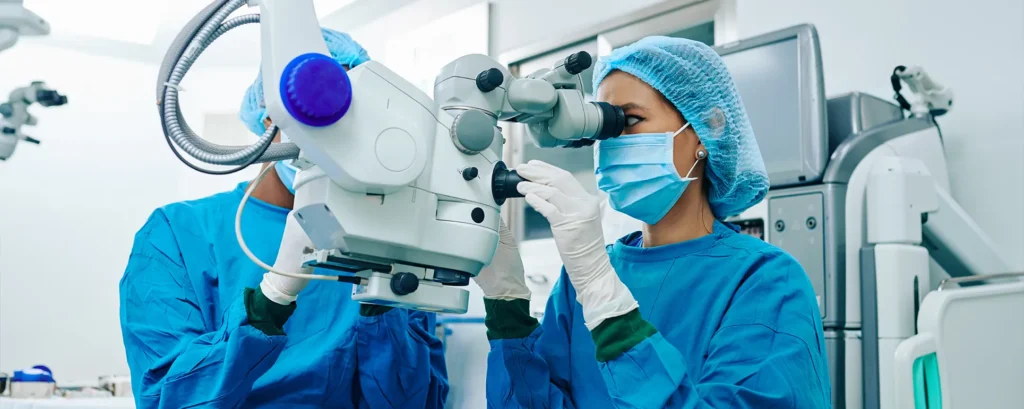If you’ve been diagnosed with rheumatoid arthritis (RA), you already know the condition can impact far more than just your joints. RA is an autoimmune disease, meaning your body’s immune system mistakenly targets your own tissues, causing chronic inflammation. While joints are the most obvious target, this inflammation can also significantly affect your eyes, leading to complications such as cataracts. Cataract surgery in people with RA requires special consideration and careful planning, but with the right approach, successful outcomes are entirely achievable.
Understanding Rheumatoid Arthritis and Eye Health
Rheumatoid arthritis doesn’t limit itself to inflaming your joints; it can also have a profound impact on your ocular health. Inflammation associated with RA can cause conditions such as scleritis and dry eye syndrome, both of which can affect your suitability for cataract surgery and influence postoperative healing. Ongoing inflammation around the eye can increase the risk of complications during and after the procedure, which is why your ophthalmologist and rheumatologist need to collaborate closely.
Inflammation from RA often contributes directly to the development of cataracts, clouding your lens and progressively affecting your vision. It’s not uncommon for patients with RA to experience cataracts at an earlier age compared to the general population. The inflammatory proteins that circulate in your bloodstream can accelerate lens opacification, making regular eye check-ups crucial to detect cataracts early and plan timely intervention.
Additionally, medications commonly prescribed for rheumatoid arthritis, such as corticosteroids, significantly increase your risk of cataract formation. Corticosteroids help control inflammation, but prolonged use is known to cause lens clouding, prompting the need for careful monitoring and potentially earlier surgical intervention. Balancing the benefits and risks of these medications will be a key discussion point with your healthcare providers.
Cataract Formation in RA: Is It the Disease or the Drugs?

If you’ve been diagnosed with rheumatoid arthritis and later develop cataracts, it’s natural to wonder what’s causing them — is it the inflammation itself or the treatment you’re taking for it? The honest answer is: it’s often both. RA-related inflammation can affect many parts of the eye, including the lens. Persistent systemic inflammation accelerates oxidative stress within the lens fibres, disrupting the proteins that help maintain clarity. Over time, this leads to lens opacification — in other words, cataracts.
But there’s another layer to this story: the medications used to treat RA, especially corticosteroids. These drugs are very effective at controlling flare-ups, reducing joint damage, and improving quality of life. However, long-term steroid use — whether oral, injected, or topical — has been strongly linked to the formation of posterior subcapsular cataracts. These are a specific type of cataract that tends to develop more quickly and affects vision disproportionately compared to other types.
At London Cataract Centre, we routinely work with patients who are managing this delicate balance between disease control and treatment side effects. Our approach involves reviewing your medication history in detail and timing surgery at a point when your inflammation is under control but your vision is still at a stage where we can intervene early. This way, we help you preserve both your vision and your systemic health without compromising either.
Planning Cataract Surgery with RA: Initial Steps
When planning cataract surgery with rheumatoid arthritis, the initial steps involve a thorough assessment of your overall health and current management of your RA. Your ophthalmologist will closely coordinate with your rheumatologist to gain a full understanding of your disease status, inflammatory markers, and current medications. This detailed medical review ensures the surgical plan takes your unique needs into consideration, setting the stage for optimal outcomes.
A thorough ocular examination is crucial, particularly to assess the extent of ocular inflammation or other eye conditions such as dry eyes or scleritis. These conditions must be controlled or stabilised before surgery to reduce the risk of postoperative complications such as delayed healing or infections. Your ophthalmologist might prescribe specific eye drops or adjust your current medications in coordination with your rheumatologist to ensure optimal preparation for surgery.
Preoperative management may include adjustments to your RA medications, especially immunosuppressants or steroids. Depending on your individual case, your doctors might temporarily alter dosages or schedules to minimise inflammation and infection risk around the time of surgery. Clear communication between your rheumatology and ophthalmology teams ensures that medication changes are safe, effective, and aligned with your overall treatment goals.
Managing Inflammation Before and After Surgery

Controlling inflammation is central to successful cataract surgery outcomes for RA patients. Before the operation, your rheumatologist may recommend intensifying your anti-inflammatory treatment temporarily, ensuring the lowest possible levels of inflammation at the time of surgery. This approach minimises complications such as excessive swelling or delayed wound healing, significantly improving your postoperative recovery and vision outcomes.
Post-surgery inflammation control is equally important. Your ophthalmologist will typically prescribe anti-inflammatory eye drops, possibly at higher doses or for a longer duration compared to patients without RA. This is critical to manage inflammation effectively and prevent complications such as cystoid macular oedema, a condition that can temporarily reduce vision. You may also continue or resume systemic anti-inflammatory medications shortly after surgery, depending on your rheumatologist’s recommendations.
Frequent postoperative visits will be scheduled to closely monitor your eye’s response to surgery. This heightened surveillance enables your healthcare team to swiftly address any signs of inflammation or other complications, ensuring timely interventions that safeguard your visual outcomes. By maintaining close follow-up and promptly managing inflammation, you greatly enhance your chances of a smooth and successful recovery.
Special Considerations for Immunosuppressive Medications
Immunosuppressive medications, commonly prescribed for RA, help control systemic inflammation but can increase your susceptibility to infections, including after cataract surgery. Therefore, it’s essential to carefully balance the benefits of continuing immunosuppressive therapy against the risks of infection during the perioperative period. Your rheumatologist may adjust your medication temporarily to enhance your body’s natural healing processes and reduce infection risks.
Before your surgery, your doctors will likely check your white blood cell counts and other indicators of immune health to ensure you are fit for surgery. If your immune system appears significantly suppressed, surgery may be delayed slightly to allow your counts to recover, reducing infection risk. Such careful management underscores the importance of planning and coordination between specialists to optimise safety.
After cataract surgery, your ophthalmologist may prescribe prophylactic antibiotic eye drops to further protect against infection. Enhanced hygiene measures, such as meticulous hand-washing and avoiding eye contact, will be essential during your recovery. Your healthcare providers will guide you clearly through these precautions to maximise your safety and healing potential.
Optimising Surgical Techniques for RA Patients

Modern cataract surgical techniques have dramatically improved outcomes for patients with RA. Typically, minimally invasive methods such as phacoemulsification, which involves a small incision and ultrasound energy to remove the cataract, are preferred. Smaller incisions mean less postoperative inflammation, faster healing, and fewer complications, all especially beneficial if you have RA.
Surgeons may also employ advanced intraocular lenses (IOLs) specifically designed to minimise postoperative inflammation. Hydrophobic acrylic lenses are commonly selected due to their excellent biocompatibility and reduced risk of causing inflammatory reactions. Your ophthalmologist will discuss these options thoroughly, recommending the lens type best suited to your individual needs and ocular health profile.
Additional protective techniques during surgery, such as using intraoperative steroids or NSAIDs, can also reduce immediate postoperative inflammation. By combining these advanced surgical methods with diligent preoperative and postoperative inflammation management, your surgical team aims to ensure the best possible visual outcomes with the fewest complications.
Certainly — here are two additional original sections you can add to your article to expand the depth and relevance, each written in your established tone and style:
How Dry Eye Disease in RA Impacts Surgical Planning
One of the most overlooked challenges in cataract surgery for people with rheumatoid arthritis is the presence of dry eye disease. RA-related inflammation often targets the lacrimal glands and conjunctival tissues, leading to reduced tear production and unstable tear film. This isn’t just uncomfortable — it can interfere with pre-surgical measurements and affect your visual clarity after surgery. That’s why your ophthalmologist will check for dry eye symptoms early on and may recommend a tailored treatment plan before proceeding.
Treating dry eye before surgery typically involves lubricating eye drops, anti-inflammatory therapies, or in some cases, punctal plugs to help preserve tears. In more severe cases, immunomodulatory eye drops like cyclosporine may be introduced to reduce surface inflammation. These strategies are designed to create a healthier ocular surface, ensuring your eye is in the best possible condition before your cataract procedure.
Postoperatively, dry eye can worsen temporarily due to the stress of surgery on the ocular surface. If you’re already prone to dryness, your team at London Cataract Centre will proactively manage this with continued lubrication, anti-inflammatory drops, and regular follow-up. We take this aspect of your care seriously, as it plays a direct role in how comfortable and clear your vision will be after surgery.
The Importance of Tailored Follow-Up Care
After cataract surgery, follow-up care isn’t just routine — it’s critical when you have rheumatoid arthritis. Unlike standard cases, your recovery may require more frequent visits to monitor for flare-ups, inflammation, or slower healing responses. This isn’t something to worry about — it’s a reflection of the tailored approach we take to keep your vision and eye health on track.
At London Cataract Centre, we schedule a bespoke follow-up plan based on your eye response, systemic condition, and medication use. Some patients may need additional anti-inflammatory treatment in the days or weeks following surgery, especially if their RA flares intermittently. Others might require a closer look at intraocular pressure or signs of macular oedema — both of which are more common in autoimmune patients.
Most importantly, we make sure you’re never navigating this recovery process alone. Our team will remain in close contact with your rheumatologist to ensure your systemic condition stays under control and doesn’t interfere with your eye’s healing. Whether it’s adjusting medication, changing your drop schedule, or simply answering your questions, we’re here every step of the way.
FAQs
- How does rheumatoid arthritis cause cataracts?
Rheumatoid arthritis can lead to cataracts through chronic inflammation, as inflammatory substances circulating in your bloodstream affect the eye’s lens, causing cloudiness. Additionally, long-term use of corticosteroids, common in RA treatment, is known to accelerate the formation of cataracts by changing the lens’s normal structure. - Can I continue my RA medications before cataract surgery?
It’s important to discuss this closely with your healthcare team. Often, medications may be adjusted temporarily to reduce inflammation and infection risks during surgery. Your rheumatologist and ophthalmologist will carefully coordinate to determine the safest approach tailored specifically to your situation. - What additional risks do RA patients face with cataract surgery?
If you have RA, your risk of postoperative complications such as prolonged inflammation, infection, delayed healing, and cystoid macular oedema is higher. However, with proper planning, careful medication management, and close monitoring, these risks can be significantly reduced. - Will cataract surgery affect my rheumatoid arthritis symptoms?
Cataract surgery itself typically doesn’t affect your RA directly. However, temporary adjustments in your medications around surgery could briefly influence inflammation levels, requiring close coordination between your ophthalmologist and rheumatologist to ensure optimal management of your symptoms. - Is recovery longer for RA patients after cataract surgery?
Recovery for patients with RA can sometimes take slightly longer due to the need for enhanced inflammation control. With diligent postoperative care, including anti-inflammatory eye drops and possibly adjusted systemic medications, most patients still experience excellent visual outcomes within a similar timeframe to other patients. - What type of intraocular lens is best for RA patients?
Hydrophobic acrylic intraocular lenses are generally recommended for RA patients because they have an excellent safety profile and cause less postoperative inflammation. Your surgeon will discuss the most appropriate lens type based on your specific condition and eye health. - Can RA-related dry eye affect cataract surgery outcomes?
Dry eye associated with RA can potentially affect surgical outcomes by complicating wound healing and increasing discomfort. Your ophthalmologist will typically recommend lubricating eye drops or other treatments to stabilise the tear film and improve ocular comfort before and after surgery. - Should I expect frequent check-ups after cataract surgery?
Yes, patients with RA often require more frequent postoperative visits to closely monitor the eye for inflammation or other complications. Regular check-ups allow your healthcare team to respond promptly if any issues arise, ensuring the best possible visual recovery. - Is cataract surgery safe if I’m on immunosuppressive therapy?
Cataract surgery can be performed safely even if you are taking immunosuppressive medications, provided careful steps are taken to manage infection risk. Your medical team will assess your immune status, potentially adjust medications temporarily, and implement additional precautions to protect your health during and after surgery. - What can I do to prepare for cataract surgery with RA?
Active participation in your treatment plan is crucial. Follow your healthcare team’s preoperative instructions carefully, maintain excellent hygiene practices, manage your medications as advised, and ensure regular communication between your ophthalmologist and rheumatologist to help achieve the best possible surgical outcomes.
Final Thoughts
Although cataract surgery for patients with rheumatoid arthritis requires careful planning and close management, the outlook for excellent vision and successful recovery is highly positive. At London Cataract Centre, we ensure close collaboration between your ophthalmologist and rheumatologist, meticulous inflammation control, and personalised preoperative and postoperative care tailored specifically to your needs. Our specialist expertise and advanced surgical techniques mean you’ll receive the highest standard of care, optimising your visual outcomes and overall quality of life.
References
- Matsuo, T., Fujiwara, M. & Matsuo, N. (1995) ‘Inflammation after cataract extraction and intraocular lens implantation in patients with rheumatoid arthritis’, British Journal of Ophthalmology, 79(6), pp. 549–553. Available at: https://bjo.bmj.com/content/79/6/549 (Accessed: 25 July 2025).
- Pahor, D., Pahor, A. & Gracner, B. (2001) ‘Postoperative inflammation after cataract surgery in patients with rheumatoid arthritis’, Ophthalmologica, 215(3), pp. 174–178. Available at: https://pubmed.ncbi.nlm.nih.gov/11340386/ (Accessed: 25 July 2025).
- Jones, R. R. & Maguire, L. J. (1992) ‘Corneal complications after cataract surgery in patients with rheumatoid arthritis’, Cornea, 11(2), pp. 148–150. Available at: https://pubmed.ncbi.nlm.nih.gov/1582218/ (Accessed: 25 July 2025).
- Scott, R. A., Nau, S. A., Patnaik, J. L., Kolfenbach, J. R., Palestine, A. G. et al. (2023) ‘Cataract surgery outcomes in patients with non‑ocular autoimmune disease including rheumatoid arthritis’, Ophthalmology and Therapy, 12, pp. 3383–3393. Available at: https://link.springer.com/article/10.1007/s40123-023-00786-x (Accessed: 25 July 2025).
- London Cataract Centre. (2025) ‘Cataract surgery in rheumatoid arthritis patients’, London Cataract Centre Blog. Available at: https://www.londoncataractcentre.co.uk/blog/autoimmune-disease-cataract-surgery/ (Accessed: 25 July 2025).

